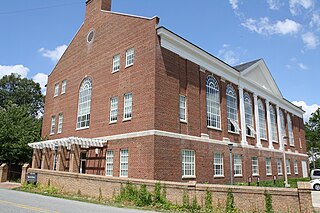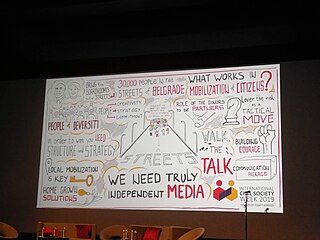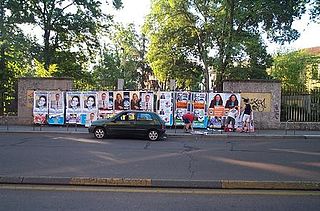 W
WDemocracy refers to a form of government in which the people either have the authority to choose their governing legislators, or the authority to decide on legislation. Who is considered part of the people and how authority is shared among or delegated by the people has changed over time and at different speeds in different countries, but more and more of the inhabitants of countries have generally been included. Cornerstones of democracy include freedom of assembly and speech, inclusiveness and equality, membership, consent, voting, right to life and minority rights.
 W
WThe Center for the Study of Democracy is a research and education institute at St. Mary's College of Maryland that focuses on the study of the history of emerging democracy in St. Mary's City, Maryland, the site of Maryland'a first colonial capital and the location of many firsts in the development of democratic rights in North America; this work is done in conjunction with studies of modern democracies.
 W
WCivic virtue is the harvesting of habits important for the success of the community. Closely linked to the concept of citizenship, civic virtue is often conceived as the dedication of citizens to the common welfare of their community even at the cost of their individual interests. The identification of the character traits that constitute civic virtue has been a major concern of political philosophy. The term civility refers to behavior between persons and groups that conforms to a social mode, as itself being a foundation of society and law.
 W
WCivil society can be understood as the "third sector" of society, distinct from government and business, and including the family and the private sphere. By other authors, civil society is used in the sense of 1) the aggregate of non-governmental organizations and institutions that manifest interests and will of citizens or 2) individuals and organizations in a society which are independent of the government.
 W
WThe Community of Democracies (CoD) is an intergovernmental coalition of states established in 2000. Its aim is to bring together governments, civil society and the private sector in the pursuit of the common goal of supporting democratic rules, expand political participation, advance and protect democratic freedoms, and strengthening democratic norms and institutions around the world. The task of more democracy is outlined in the Warsaw Declaration. It is disputed if the CoD qualifies as an International Organization in the legal sense.
 W
WConsensus decision-making or consensus politics is group decision-making processes in which participants develop and decide on proposals with the aim, or requirement, of acceptance by all. The focus on establishing agreement of the supermajority and avoiding unproductive opinion, differentiates consensus from unanimity, which requires all participants to support a decision.
 W
WWhile Marxists propose replacing the bourgeois state with a proletarian semi-state through revolution, which would eventually wither away, anarchists warn that the state must be abolished along with capitalism. Nonetheless, the desired end results, a stateless, communal society, are the same.
 W
WThe Democracy Index is an index compiled by the Economist Intelligence Unit (EIU), the research division of the Economist Group, a UK-based private company which publishes the weekly newspaper The Economist. The index is self-described as intending to measure the state of democracy in 167 countries, of which 166 are sovereign states and 164 are UN member states.
 W
WDemocracy-Dictatorship (DD), index of democracy and dictatorship or simply the DD index or the DD datasets refers to the binary measure of democracy and dictatorship first proposed by Adam Przeworski et al. (2010), and further developed and maintained by Cheibub, Gandhi, and Vreeland (2009). Though the most recent data set is only updated for 2008, there is planning by Cheibub to update it to the present year.
 W
WDemocratic backsliding, also known as autocratization and de-democratization, is a gradual decline in the quality of democracy and the opposite of democratization, which may result in the state losing its democratic qualities, becoming an autocracy or authoritarian regime. Democratic decline is caused by the state-led weakening of political institutions that sustain the democratic system, such as the peaceful transition of power or electoral systems. Although these political elements are assumed to lead to the onset of backsliding, other essential components of democracy such as infringement of individual rights and the freedom of expression question the health, efficiency and sustainability of democratic systems over time.
 W
WThe question of whether the governance of the European Union (EU) lacks democratic legitimacy has been debated since the time of the European Economic Community in the late 1970s. This led in part to an elected European Parliament being created in 1979 and given the power to approve or reject EU legislation. Since then, usage of the term has broadened to describe newer issues facing the European Union. Voter turnout at Elections to the European Parliament fell consecutively at every election from the first in 1979 up to 2014, when it hit a low of 42.54% before finally rising in 2019. The 2014 turnout figure is lower than that of any national election in the 27 countries of the European Union, where turnout at national elections averages 68% across the EU.
 W
WDemocratic education is an educational ideal in which democracy is both a goal and a method of instruction. It brings democratic values to education and can include self-determination within a community of equals, as well as such values as justice, respect and trust.
 W
WA democratic revolution is a political science term denoting a revolution in which a democracy is instituted, replacing a previous non-democratic government, or in which revolutionary change is brought about through democratic means.
 W
WIn Marxist philosophy, the dictatorship of the proletariat is a state of affairs in which the proletariat holds political power. The dictatorship of the proletariat is the intermediate stage between a capitalist economy and a communist economy, whereby the post-revolutionary state seizes the means of production, compels the implementation of direct elections on behalf of and within the confines of the ruling proletarian state party, and instituting elected delegates into representative workers' councils that nationalise ownership of the means of production from private to collective ownership. During this phase, the administrative organizational structure of the party is to be largely determined by the need for it to govern firmly and wield state power to prevent counterrevolution and to facilitate the transition to a lasting communist society. Other terms commonly used to describe the dictatorship of the proletariat include socialist state, proletarian state, democratic proletarian state, revolutionary dictatorship of the proletariat and democratic dictatorship of the proletariat.
 W
WAn Education index is a component of the Human Development Index published every year by the United Nations Development Programme. Alongside the GDP Index and Life Expectancy Index, it helps measure the educational attainment, GDP per capita and life expectancy of countries.
 W
WElections in Cuba are held at municipal, provincial, and national levels. Elections in Cuba are not democratic. Cuba is a single-party authoritarian state with the Communist Party of Cuba as the "leading force of society and of the state" under the national constitution. Candidates for National Assembly of People's Power elections are are nominated by organs that are firmly controlled by the Communist Party of Cuba.
 W
WTwo central issues for democracies are the right to candidate, and suffrage or the franchise—that is, the decision as to who is entitled to vote. For example, Athenian democracy limited the vote to male citizens, while slaves, foreigners, and women of any status were excluded. Requirements and exclusions such as these, along with racial prohibitions, have been common in democracies. The definition of legal personhood has been historically tied up with these questions.
 W
WThe End of History and the Last Man (1992) is a book of political philosophy by American political scientist Francis Fukuyama which argues that with the ascendancy of Western liberal democracy—which occurred after the Cold War (1945–1991) and the dissolution of the Soviet Union (1991)—humanity has reached "not just ... the passing of a particular period of post-war history, but the end of history as such: That is, the end-point of mankind's ideological evolution and the universalization of Western liberal democracy as the final form of human government." For the book, which is an expansion of his essay, "The End of History?" (1989), Fukuyama draws upon the philosophies and ideologies of Georg Wilhelm Friedrich Hegel and Karl Marx, who define human history as a linear progression, from one socioeconomic epoch to another.
 W
WThe European Inter-University Centre for Human Rights and Democratisation (EIUC) is an interdisciplinary centre covering the area of human rights education and research formed by 41 universities from all European Union member states. The EIUC's activities include interdisciplinary education of students worldwide; developing training for senior officials of international organisations, field personnel, and other human rights professionals; identifying means of transferring academic expertise to the public, such as using visual arts and mass media; creating an environment for research cooperation; representing a network of graduates of the European Master's Programme in Human Rights and Democratisation. The centre is housed in the Monastery of San Nicolò al Lido which has been made available to the EIUC by the Municipality of Venice, Italy.
 W
WFamily voting is when family members enter a voting booth together and collude or direct voting intentions.
 W
WThe Federalist Papers is a collection of 85 articles and essays written by Alexander Hamilton, James Madison, and John Jay under the collective pseudonym "Publius" to promote the ratification of the United States Constitution. The collection was commonly known as The Federalist until the name The Federalist Papers emerged in the 20th century.
 W
WFreedom House is a non-profit non-governmental organization (NGO) that conducts research and advocacy on democracy, political freedom, and human rights. Freedom House was founded in October 1941, and Wendell Willkie and Eleanor Roosevelt served as its first honorary chairpersons.
 W
WGödel's Loophole is an "inner contradiction" in the Constitution of the United States which Austrian-German-American logician, mathematician, and analytic philosopher Kurt Gödel claimed to have discovered in 1947. The flaw would have allowed the American democracy to be legally turned into a dictatorship. Gödel told his friend Oskar Morgenstern about the existence of the flaw and Morgenstern told Albert Einstein about it at the time, but Morgenstern, in his recollection of the incident in 1971, never mentioned the exact problem as Gödel saw it. This has led to speculation about the precise nature of what has come to be called "Gödel's Loophole". It has been called "one of the great unsolved problems of constitutional law."
 W
WThe Iron Front was a German paramilitary organization in the Weimar Republic which consisted of social democrats, trade unionists, and liberals. Its main goal was to defend liberal democracy against totalitarian ideologies on the far right and far left. The Iron Front chiefly opposed the Sturmabteilung (SA) wing of the Nazi Party and the Antifaschistische Aktion wing of the Communist Party of Germany. Formally independent, it was intimately associated with the Social Democratic Party of Germany (SPD). The Three Arrows, originally designed for the Iron Front, became a well-known social democratic symbol representing resistance against monarchism, Nazism, and communism during the parliamentary elections in November 1932. The Three Arrows were later adopted by the SPD itself.
 W
WA kleroterion was a randomization device used by the Athenian polis during the period of democracy to select citizens to the boule, to most state offices, to the nomothetai, and to court juries.
 W
WLiberal democracy, also referred to as Western democracy, is a political ideology and a form of government in which representative democracy operates under the principles of liberalism. It is characterised by elections between multiple distinct political parties, a separation of powers into different branches of government, the rule of law in everyday life as part of an open society, a market economy with private property, and the equal protection of human rights, civil rights, civil liberties and political freedoms for all people. To define the system in practice, liberal democracies often draw upon a constitution, either codified or uncodified, to delineate the powers of government and enshrine the social contract. After a period of expansion in the second half of the 20th century, liberal democracy became a prevalent political system in the world.
 W
WMonitory democracy is a phase of democracy characterised by instruments of public monitoring and scrutinising of government power. It began following the events of the Second World War. The theory was coined by Australian Professor John Keane.
 W
WFounded in 1955, the NATO Parliamentary Assembly serves as the consultative interparliamentary organisation for the North Atlantic Alliance. Its current President is Gerald E. Connolly from the United States, elected in 2019. Its current Secretary General is Ruxandra Popa; she has been in this position since January 2020.
 W
WOne man, one vote expresses the principle that individuals should have equal representation in voting. This slogan is used by advocates of political equality to refer to such electoral reforms as universal suffrage, proportional representation, and the elimination of plural voting, malapportionment, or gerrymandering.
 W
WCitizen Participation or Public Participation in social science refers to different mechanisms for the public to express opinions – and ideally exert influence – regarding political, economic, management or other social decisions. Participatory decision-making can take place along any realm of human social activity, including economic, political, management, cultural or familial.
 W
WThe party of Internet DEmocracy was a Hungarian political party, which was established at 23 July 2004 in Gyöngyös.
 W
WThe democratic peace theory posits that democracies are hesitant to engage in armed conflict with other identified democracies. Among proponents of the democratic peace theory, several factors are held as motivating peace between democratic states:Democratic leaders are forced to accept responsibility for war losses to a voting public; Publicly accountable statespeople are inclined to establish diplomatic institutions for resolving international tensions; Democracies are not inclined to view countries with adjacent policy and governing doctrine as hostile; Publicly accountable democracies require justification to start a conflict and are thus slow to mobilise, minimising the risk of a surprise aggressive attack; Democracies tend to possess greater public wealth than other states, and therefore eschew war to preserve infrastructure and resources.
 W
WA peaceful transition or transfer of power is a concept important to democratic governments in which the leadership of a government peacefully hands over control of government to a newly-elected leadership. This may be after elections or during the transition from a different kind of political regime, such as the postcommunist period after the fall of the Soviet Union, or the elections in Libya following the fall of Muammar Gaddafi.
 W
WThe Polity data series is a data series in political science research. Along with the Varieties of Democracy project and Freedom House, Polity is among prominent datasets that measure democracy and autocracy.
 W
WThe term post-democracy was used by Warwick University political scientist Colin Crouch in 2000 in his book Coping with Post-Democracy. It designates states that operate by democratic systems, but whose application is progressively limited. A small elite is taking the tough decisions and co-opts the democratic institutions. Crouch further developed the idea in an article called Is there a liberalism beyond social democracy? for the think tank Policy Network and in his subsequent book The Strange Non-Death of Neo-Liberalism.
 W
WThe Potsdam Declaration, or the Proclamation Defining Terms for Japanese Surrender, was a statement that called for the surrender of all Japanese armed forces during World War II. On July 26, 1945, United States President Harry S. Truman, United Kingdom Prime Minister Winston Churchill, and President of China Chiang Kai-shek issued the document, which outlined the terms of surrender for the Empire of Japan, as agreed upon at the Potsdam Conference. The ultimatum stated that, if Japan did not surrender, it would face "prompt and utter destruction."
 W
WPrime Minister's Questions is a constitutional convention in the United Kingdom, currently held as a single session every Wednesday at noon when the House of Commons is sitting, during which the Prime Minister answers questions from Members of Parliament (MPs).
 W
WThe public sphere is an area in social life where individuals can come together to freely discuss and identify societal problems, and through that discussion influence political action. Such a discussion is called public debate and is defined as the expression of views on matters that are of concern to the public—often, but not always, with opposing or diverging views being expressed by participants in the discussion. Public debate takes place mostly through the mass media, but also at meetings or through social media, academic publications and government policy documents. The term was originally coined by German philosopher Jürgen Habermas who defined the public sphere as "made up of private people gathered together as a public and articulating the needs of society with the state". Communication scholar Gerard A. Hauser defines it as "a discursive space in which individuals and groups associate to discuss matters of mutual interest and, where possible, to reach a common judgment about them". The public sphere can be seen as "a theater in modern societies in which political participation is enacted through the medium of talk" and "a realm of social life in which public opinion can be formed".
 W
WRambhau Mhalgi Prabodhini is a not-for-profit organisation established in memory of the Rambhau Mhalgi. Established in 1982, RMP is a training and research academy for voluntary activists and elected representatives of the people. RMP operates nationally through its offices in Delhi, Pune, Mumbai, and its headquarters in Thane.
 W
WSEALDs, short for Students Emergency Action for Liberal Democracy , was a student activist organisation in Japan that organised protests against the ruling coalition headed by Prime Minister Shinzō Abe in 2015 and 2016. Its focus was on the security-related bills enacted in 2015 that allow the Japanese Self-Defense Force to be deployed overseas.
 W
WSovereignty unconditionally belongs to the People is the founding principle of the Republic of Turkey. This principle is written on the wall behind the chairman of the General Assembly Hall in the Grand National Assembly.
 W
WSynoecism or synecism, also spelled synoikism, was originally the amalgamation of villages in Ancient Greece into poleis, or city-states. Etymologically the word means "dwelling together (syn) in the same house (oikos)." Subsequently, any act of civic union between polities of any size was described by the word synoikismos. The closest analogy today is the incorporation of a city; in fact, "incorporation" is often used to translate synoikismos, in addition to the Latinized synoecism. Synoecism is opposed to Greek dioecism, the creation of independent communities within the territory of a polis.
 W
WVirtual representation was the idea that the members of Parliament, including the Lords and the Crown-in-Parliament, reserved the right to speak for the interests of all British subjects, rather than for the interests of only the district that elected them or for the regions in which they held peerages and spiritual sway. Virtual representation was the British response to the First Continental Congress in the American colonies. The Second Continental Congress asked for representation in Parliament in the Suffolk Resolves, also known as the first Olive Branch Petition. Parliament claimed that their members had the well being of the colonists in mind. The Colonies rejected this premise.